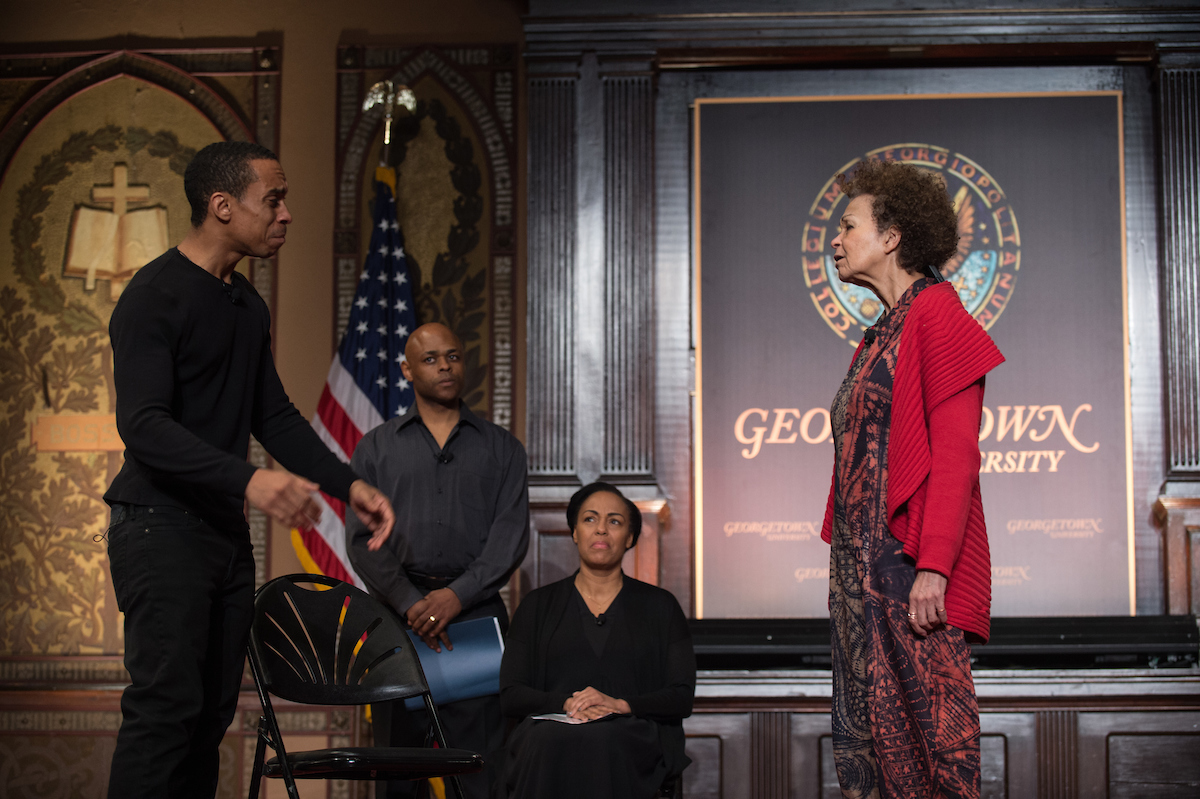
Imagine trying to win a tennis match with your legs tied together, or a chess championship blindfolded. Anyone handicapped like that would be doomed to failure. And yet, that is exactly how the United States is facing (one can no longer say “leading”) the world in the Trump era.
American arts and culture are our calling card to the world: whether poetry and literature from Harriet Beecher Stowe to Walt Whitman to Maya Angelou, jazz in the Cold War or hip hop and television today, the United States is known around the world through its creative voice. And yet, Trump plans to eliminate the arts and humanities from the US diplomacy toolbox. His budget zeroes out the National Endowment for the Arts and the National Endowment for the Humanities, and the Department of Educational and Cultural Affairs is slated for elimination in the State Department budget cuts.
The Laboratory for Global Performance and Politics (The Lab) at Georgetown University (which I co-direct) celebrated World Theatre Day on March 27 with an event that demonstrated what would be lost with this slash and burn approach to the arts and humanities. Dreams Deferred: Crossing Continents and Cultures with A Raisin in the Sun brought together theatre makers from South Africa, Sweden, and Washington, DC all inspired by Hansberry’s story of a struggling African American family. The event was livestreamed on HowlRoundTV, and you can see the archived video here.
Anika Noni Rose, who appeared as Beneatha in the 2014 Raisin revival on Broadway starring Denzel Washington, pinpointed the universality in Hansberry’s drama that takes place in a cramped apartment on Chicago’s south side: “Lorraine Hansberry had a mainline to the truth. Her characters are speaking words that people recognize within themselves.”
The audience that filled Georgetown’s majestic Gaston Hall on World Theatre Day heard how the dreams, frustrations, and indignities of the Younger family struck a chord—in post-apartheid South Africa, in Sweden struggling with waves of immigrants, and in an America riven with divisions. As a measure of how profoundly this cross-cultural encounter moved the audience, a cousin of Emmett Till, Deborah Watts, in Washington, DC to meet with Jeff Sessions to demand justice for Till’s murder, rose to say that “Emmett Till’s spirit is in this room,” an especially poignant comment since Till came from the south side of Chicago.
James Ngcobo, the first black South African director of the legendary Market Theatre that played such a critical role in the anti-apartheid movement, explained that he felt he “had to do A Raisin in the Sun” after overhearing a friend in Johannesburg talk about how his family was “waiting on an insurance check” to determine their future (the central plotline of Raisin). Ngcobo timed his production to commemorate the fortieth anniversaries of the Soweto uprising and the Market Theatre.
For Ngcobo and his audience, the premise of “dreams deferred” behind the title, inspired by Langston Hughes’s poem Harlem (“What happens to a dream deferred? Does it dry up like a raisin in the sun?….”) resonated deeply in today’s South Africa. Noting that the play could have taken place “in Alexandra township,” Ngcobo recalled that audiences at the Market said of the struggles of Hansberry’s Younger family, “We know this life.” To black South Africans moving out of the townships into previously all-white suburbs, the hostility encountered by the Younger family in Raisin—and indeed Lorraine Hansberry herself in her own life—when they purchased a house in a white neighborhood seemed all too familiar.
Producing the first A Raisin in the Sun ever seen in Sweden gave Josette Bushnell-Mingo OBE, an Afro-British Director working in Sweden, the chance “to hear her own language spoken on the stage.” The Afro-Swedish actors appreciated the opportunity Raisin offered to portray characters who seemed familiar, who they understood intuitively, on the stage in Sweden. For the audiences, mostly white Swedish, who thronged to the play on its forty-three stop tour around the country, Raisin confronted them, as it did and does American audiences, with uncomfortable truths, in the familiar context of a family drama. Waves of immigration have brought turmoil to the home of the Nobel Peace Prize, as evidenced by the threats Bushnell-Mingo received, along with accolades, for her Raisin in the Sun country-wide tour.
Think of it: the words and the story created in 1959 by twenty-nine-year-old Lorraine Hansberry—herself a pioneer and symbol of resistance as the first black woman to have a play produced on Broadway—sound intimately familiar to people in South Africa and Sweden today. What better way to connect with people around the world than through stories in which we all can see ourselves, our families, our friends? At the Georgetown event, actors speaking Swedish and English seamlessly performed scenes together, embodying the cross-cultural resonance of Hansberry’s poignant portrayal of dreams deferred. Through Walter Lee Younger, a coiled spring of frustration and unfulfilled aspiration, Hansberry showed her understanding that work is about much more than a paycheck: it is about dignity. And the search for dignity transcends borders.
Theatre and the storytelling embedded in it matter in the dangerous times we live in, where frustrations not unlike those felt by the Younger family in Raisin are unleashed all too often with acts of random violence, in cities such as Paris, London, Stockholm, and Orlando. Theatre cannot solve today’s problems of division, terrorism, and extremism, but it can provide a first step by fostering an element all too often missing in domestic and international politics today: empathy. Derek Goldman, Co-Director of the Lab, put it best, “Theatre isn’t good at everything, but it can be spectacularly good at countering polarization through the empathy it enables in a live, communal setting, and through its capacity to humanize others.”
The mission of the Laboratory for Global Performance and Politics—humanizing global politics through the power of performance—seems especially urgent today when division and intolerance are not only condoned but propagated from the highest levels of government. The Lab’s mission dovetails with the original goal of Georgetown’s School of Foreign Service (SFS) where the Lab is housed: “peace through understanding,” a potent aspiration in 1919, when the SFS was founded, in the wake of World War I. Narratives, particularly as experienced through live performance, have a critical role to play in increasing understanding and fostering empathy across c
ultures—a first step towards peace, and an essential component of international relations. It is a trope that today we are virtually connected across the globe, and that is important. But nothing replaces the palpable connections engendered by live theatre.
Lorraine Hansberry wrote about A Raisin in the Sun, “I think I wrote a play that tells the truth.” And that is what good art does: it tells the truth in a way that transcends borders, that builds connections that long outlive temporal political personalities and movements. For the US government to eliminate funding to its artists—however small the actual sums distributed by the Endowment for Arts and Humanities might be—and basically to dismiss the arts as unimportant, is to deny the essential truth of America’s outreach to the world through our stories, our music, our art, our dance. What is the alternative?
This piece, “The Essential Truth of A Raisin in the Sun and Theatre in Our Time” by Cynthia P. Schneider was originally published on HowlRound, a knowledge commons by and for the theatre community, on April 30, 2017.
To purchase a copy of A Raisin in the Sun click here, and to learn more about licensing a production, click here.

Newly Available for Licensing – January 2026 (UK)

Newly Available for Licensing – January 2026 (US)

